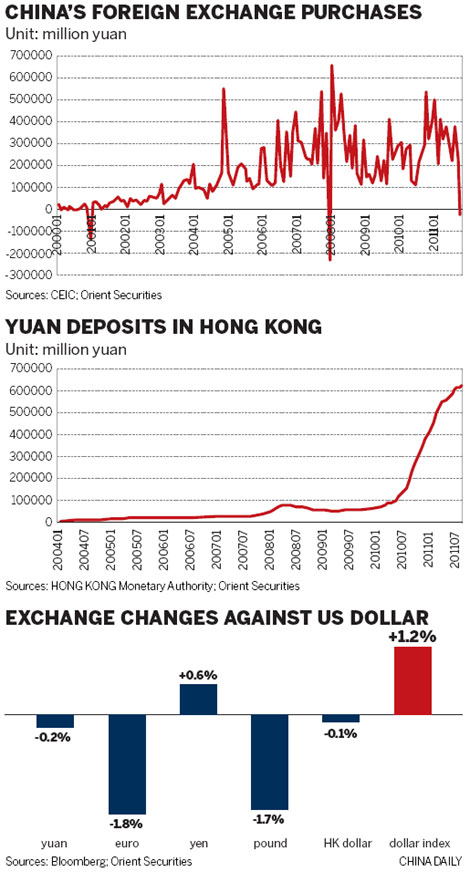European gloom causes credit squeeze
Updated: 2011-12-12 07:57
By Li Tao and Wu Yiyao (China Daily)
|
|||||||||
|
|
|
|
Multinational companies are now seeking local funds to grow in China
HONG KONG / SHANGHAI - Concerted action by the world's biggest central banks to lower borrowing costs and boost the global economy amid the eurozone's worsening sovereign-debt crisis has failed to dispel growing concerns of a worldwide credit squeeze.
The latest reports of a pullback by lenders in Europe and, to a lesser extent, the United States, have sounded a clarion call for many multinational companies, especially those headquartered in France or Germany. They are now scrambling to locate other funding sources to finance their expansion plans in China, which remains one of the few bright spots amid the global gloom.
Some foreign companies are rushing to establish new, or bigger, credit lines with domestic banks, including the more aggressive non-State-owned lenders, and overseas banks with access to the large offshore yuan pool in Hong Kong. Others are making preparations to directly tap Hong Kong's offshore yuan capital market through bond issues. There are also those who have shown an interest in selling equities to Chinese investors on the proposed International Board of the Shanghai Stock Exchange, when it eventually begins trading.
Indeed, large and small companies around the world - ranging from international airlines, shipping giants, property developers, manufacturing conglomerates and even restaurateurs and wine sellers - are reported to be feeling the strain as European banks reduce lending in an effort to hoard capital and shore up their balance sheets.
The specter of another global credit seizure - which, if it occurs, is widely expected to be on a bigger scale than the one after the collapse of Lehman Brothers Holdings Inc in 2008 - is forcing many multinational companies to re-examine their global investment plans. However, cutting back on expansion in the Chinese market seems to be the last thing on their minds.
Ken Greene, president and managing director, Asia Pacific, of the Wyndham Hotel Group, which has opened 131 hotels on the Chinese mainland in the past 12 months, said the lackluster global economy may be haunting the hotel sector, but Wyndham's ambitious expansion plan for the mainland will remain unchanged, driven by both the government's effort to develop the infrastructure and the booming growth in foreign and domestic travelers.
"Our chairman made a statement to Wall Street earlier that we are aiming to develop as many properties on the mainland as we have in the States, although our group currently encompasses about 6,200 hotels in the US while it's only around 400 on the mainland," said Greene in an exclusive interview with China Daily on Dec 1.
A source with the China-based subsidiary of one of Germany's top manufacturers of sports equipment said the company sees no need to shrink budgets or postpone market expansion in China.
"China is one of the very few markets that may promise us an increase in profit," the source said on Dec 4.
The companies' determination to stick to their original plans in China is understandable. Although the country's economic growth engine is widely expected to lose some steam in 2012 and beyond, it is still moving ahead at a considerably faster clip than the global average. The World Bank has forecast GDP growth of 8.4 percent for China in 2012.
The ratings agency Standard & Poor's placed 15 European countries on watch for possible downgrades after German Chancellor Angela Merkel and the French President Nicolas Sarkozy said on Dec 5 that they want to revamp the European Union (EU) treaty and want EU leaders to meet on a monthly basis. However, the possibility of using eurobonds and the central banks as lenders of last resort has been ruled out for the time being.
To make matters worse for companies with expansion plans in China, there has already been an outflow of funds and the yuan depreciated against the US dollar in October.
At the same time, the Chinese government has been delivering mixed signals on monetary fine-tuning, thus further blurring the prospects of the yuan market.
The People's Bank of China (PBOC), the nation's central bank, cut the reserve-requirement ratio (RRR) for lenders by 50 basis points for the first time in nearly three years on Nov 30. The central bank made the move - helping to inject some 400 billion yuan ($63 billion) into the economy - to ease credit strains and shore up the economy as inflation eases.
Meanwhile, speaking at an investment seminar in Beijing, Xia Bin, an adviser to the PBOC, reiterated that the central bank would "fine-tune" its "prudent" monetary policy instead of announcing an outright shift, and added that curbs on the property market will be maintained.
The subdued performance of the manufacturing sector is also reflected in the HSBC Purchasing Managers Index for November, which slid to 47.7 from 51 in October, the lowest level since March 2009.
However, multinational companies contacted by China Daily have said that they will maintain their expansion plans in the country and have no intention of cutting budgets. That's because China is likely to remain one of the very few markets capable of maintaining growth even if the crisis in Europe eventually pushes the world into recession.
"We do not have a timetable for achieving this target, but our presence on the mainland will definitely double in five years," said Greene from Wyndham Hotels.
China's economy is expected to grow by 9.6 percent in 2011 with fixed-asset investment remaining a key driver, according to the annual report of the Asian Development Bank, released in Hong Kong earlier in the year.
Third-quarter GDP registered growth of 9.1 percent year-on-year, below general market expectations of 9.3 percent, according to data from China's National Bureau of Statistics.
Despite missing the GDP estimate, some components of the Chinese economy are holding up, including fixed-asset investment, which rose 24.9 percent year-on-year.
Unsurprisingly, some multinational companies are now desperate to find new sources of yuan funding as eurozone banks tighten credit. Some are seeking to secure improved credit lines with domestic Chinese banks.
"One of our clients is an overseas airline company. It has registered a wholly-owned subsidiary in China and in this way it can borrow money from a domestic bank, making the transaction a China-to-China banking pattern," according to an insider at Shanghai Pudong Development Bank Co Ltd.
"We have witnessed an increasing number of overseas companies doing the same thing to seek funds from domestic banks, and we have observed that the amount of yuan borrowing has increased during the past two years," said the insider.
This development has helped the domestic banks to expand their loan portfolios to multinationals and provided a business boost for foreign banks operating in China.
Moreover, many companies are stepping up their efforts to raise money in Hong Kong's capital market by issuing yuan bonds.
Since July 2010, when Hong Kong and the mainland monetary authorities signed an agreement aimed at further relaxing the restrictions on yuan transfers, a broad range of global borrowers together with mainland and Hong Kong issuers, have tapped the "dim sum" market. The companies include names such as McDonald's Corp, Caterpillar Financial Services Corp and Unilever PLC.
Meanwhile, a further easing of macro policy is widely expected, following the PBOC's November decision to lower the RRR. However, Banny Lam, a Hong Kong-based economist with CCB International Securities Ltd, believed the softened credit environment will not necessarily alter Hong Kong's attractiveness in yuan-bond issuance.
"Many companies will still feel strangled of funding because not all of them can obtain loans, even if the credit theme turns positive for local lenders. As far as I know, at this moment there are still quite a number of multinationals lining up to issue yuan-denominated bonds in Hong Kong next year," said Lam.
The offshore yuan market has more than tripled in size year-to-date to 210 billion yuan, and the dynamics continue to change rapidly, said a report from HSBC Holdings PLC, released on Nov 8.
"With domestic liquidity conditions remaining tight and the onshore-offshore interest-rate gap remaining wide, the incentive for Chinese companies to raise funding in overseas markets will remain high in the near future," said Becky Liu and Zhang Zhiming, HSBC economists and the primary authors of the report. They added that they expected gross issuance to be between 260 and 310 billion yuan next year, with the market growing to between 400 and 450 billion yuan.
Although the yuan deposit base in Hong Kong declined in October, falling to 618.5 billion yuan from 622 billion in September as expectations of appreciation fade, the city has seen explosive growth in yuan deposits over the past 14 months. The figure was only 217 billion yuan at the end of October 2010, around one-third of the current level.
"With yuan appreciation expected to slow, the focus of yuan policy will shift increasingly toward internationalization (in 2012)," noted Paul Mackel, HSBC's head of Asian currency research.
During a visit to Hong Kong in August, Vice-Premier Li Keqiang announced a basket of new measures to boost the city's economic development and to enhance cross-border cooperation, particularly on the expansion of the yuan-denominated asset market.
The Renminbi Qualified Foreign Institutional Investor (RQFII) program, also unveiled by the vice-premier, is at the top of the agenda for mainland regulators. They are accelerating moves to trial the program in a bid to facilitate offshore yuan deposits in the special administrative region that will be invested in the mainland's A-share market, reported the Xinhua News Agency on November 29, without disclosing its sources.
Hong Kong-based subsidiaries of mainland fund houses and securities firms will be allocated the initial quota of the RQFII program, the PBOC said in an e-mailed statement in September. The central bank added that 80 percent of the total designated 20 billion yuan-funded foreign investment will go into the mainland bond markets in the initial stage.
"The RQFII scheme will likely be rolled out in early 2012, if not before the end of this year. There also may be regulatory changes to promote the offshore yuan-lending market. Finally, there are likely to be substantial moves toward expanding yuan settlement beyond Hong Kong," Mackel wrote in a report released on Dec 2.
Cai Xiao in Beijing contributed to this story.














